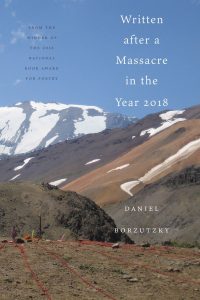Reviewed by Alivia Gore

Written After a Massacre in the Year 2018 by Daniel Borzutzky (Coffee House Press)
Published in March of 2021, this striking collection of poetry from the 2016 National Book Award winning poet Daniel Borzutzky grapples with the darker side of the reality of the world we live in—a world of inequality, oppression, violence, and massacre. With Written After a Massacre in the Year 2018, Borzutzky unapologetically establishes a reality that few are brave enough to face outright. The space that the poet creates with this work does not shy away from the cages at the border, the violence in Chile, the assassination of minorities, the immorality of capitalism, and America’s mishandling of the COVID-19 pandemic. He speaks, also, of the cyclical nature of the trauma that surrounds us: “perhaps we are always, and have always been, writing after a massacre.”
Borzutzky’s voice in this collection is near frantic. Each poem carries a sense of urgency for the reader—a sense of if I don’t listen the consequence will be dire. This is, in part, due to the way in which Borzutzky avoids creating any kind of romanticization or idealization of the violent images he speaks to. The immigrant children that he brings into this body of work are not presented as holy infants bearing a necessary weight of atonement, they are simply babies who have been locked up and “disappeared” by an institution of racism and white supremacy. Overall, the fact that these poems directly name such tyrannical forces (white supremacy, immigration policy, and consumerist culture, to name a few) without hiding them beneath metaphor or alternative phrasing is the defining factor of the work. Whereas poetry has a tradition of utilizing language and writing techniques that seek to create distance between what the poet is writing about and what the reader actually perceives (or, on the other hand, speak in short flowery phrases to convey a single image with the poem), Borzutzky’s latest release challenges the sad-yet-beautifully-uplifting tone a reader may expect of a book with such a title as Written After a Massacre.
This collection is an unforgiving elegy for the state of humanity. There is death in these pages. There is birth in these pages. There is grief in these pages. Take, for instance, a piece from the title section of the book:
One morning a man shoots at the sky and tells it not to mourn so loudly. He shoots into the gardens where the mourners jump, where they dance, where they run. Where they are afraid that they too will disappear into the earth. Like the river that disappears into the earth. Like the love that disappears into the earth…the earth that children are tossed into when they don’t know what massacre they came from.
This stanza alone represents the heart wrenching tone of Written After a Massacre in the Year 2018 as a collection—we see the violence of the shooter, the mourning of the victims, the disappearing of those who are taken from life without reason, and the chaotic cycle of massacre in our earth. These themes are repeated in different ways through each of the poems making up this collection, yet Borzutzky is never boring. Each new presentation of the violence inherent to our monetized and colonized world lands like a swift kick to the gut. The harsh reality that inspired this work is not once, for even a second, forgotten.
Some poems, such as “Risk Management,” present readers with the hard to swallow fact that the state of the world—in all its destruction, violence, policing, and oppressive government infrastructure—is a result of the people’s apathy. Capturing the border between attempting to live life as usual while the world burns and bleeds with matter-of-fact questions of action: “should I destroy the nation-state or should I take a nap / should I destroy the foundations of our liberal democracy or should I take a nap” and “should I strengthen my portfolio or should I destroy the nation-state…should I have brunch or should I redistribute the wealth.” These lines showcase the apathetic attitude of the upper class and wealthy and contrast distinctly with the descriptions in the surrounding poems of the cages, the killing, the silencing.
Overall, Daniel Borzutzky’s 2021 collection of poems Written After a Massacre in the Year 2018 pulls readers along the borders of humanity and the condition of the world we live in. The frustration at the apathy of those who hold wealth and power who do nothing to help the people, the mourning of the innocent lives that have been taken by violent mass-murderer’s hands and detention centers and viruses, the resentment toward the evil that carries the weapons that cause death—these are all tangible in every moment of the book. Burzutzky states in his end note that he is afraid of a “communal forgetting” of the innocent lives that have been lost in recent times (specifically those who were lost at the Tree of Life Synagogue on October 27, 2018). With his most recently published collection of poetry, he fights to forge memory in his readers. Certainly, when one reads this book, it is impossible to forget. Borzutzky’s writing is proof of “all of the love that survives” the massacres that we live in and carry with us every day.
